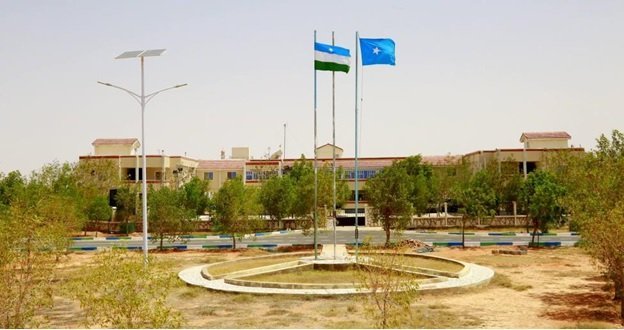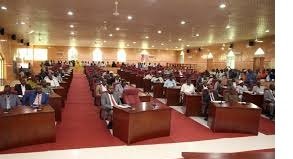PUNTLAND: CAN IT SURVIVE THE PUBLIC AWAKENING? by mohamed ismail mohamed( siibad)
 Since the new Puntland Parliament was sworn, in January 2019, many Members of Parliament were resolute on stopping the bleeding Puntland has been suffering during the past 20 years. In Puntland it was the norm for the executive branch of the government (i.e. The President) to monopolize the power of the government and use the state resources, without any accountability, for personal and private gain, which is contrary to Article 3 (2) of the Constitution of Puntland: No person, group, or a clan is allowed to usurp government power for their own private use. This author, who is an MP of the Puntland House of Representative, would help explore the abuses Puntland has been suffering and whether the gross maladministration can be reversed.
Since the new Puntland Parliament was sworn, in January 2019, many Members of Parliament were resolute on stopping the bleeding Puntland has been suffering during the past 20 years. In Puntland it was the norm for the executive branch of the government (i.e. The President) to monopolize the power of the government and use the state resources, without any accountability, for personal and private gain, which is contrary to Article 3 (2) of the Constitution of Puntland: No person, group, or a clan is allowed to usurp government power for their own private use. This author, who is an MP of the Puntland House of Representative, would help explore the abuses Puntland has been suffering and whether the gross maladministration can be reversed.

Background:
Puntland State of Somalia came into existence after delegates from different parts of the state deliberated for more than three months and agreed on an interim charter. On the 1st of August 1998 a transitional government, comprising 66 members of the House of Representatives, a president and vice president were sworn into office.
The delegates where aware that the 66 representative did not encompass full and balanced representation of the population and hence mandated and entrusted the new transitional government to draft a constitution and lead the state to a one person one vote election within three years. However, at the end of the three year period, the transitional government has failed to fulfill its mandate and tried to extend its term. As a result, a short civil war ensued (2001-2003). The unelected president came out as a victor at the expense of the other branches of the government and the road map,
However, on April 2012, 480 delegates from all over Puntland were assembled in Garowe to ratify a constitution that, once again, mandated one person one vote election to be held within a year in order to put Puntland back on track. The one person one vote election has not happened hitherto. Therefore, Puntland remains at the mercy of the President and his kin.
Recent Events:
In its June/July 2019 session the parliament of Puntland started to exercise its powers and perform its function of Scrutiny as given by Article 64 of the Constitution. It started to examine the fiscal budget report of the previous year (2018).
The results showed that, among the misuse of budget line items, $1,761,127.2 budgeted for the Ministry of Education and Higher Education was missing. According to the Auditor General: “The Ministry of Education released the sum of $1,761,127.2 from its budget illegally.”
After that audit, the parliament rejected the fiscal report of 2018 and sent it to the Attorney General to investigate the crime and charge the culprits as mandated by Article 137 (2) of the Constitution. In addition, it ratified new laws guiding the Accountant General and the Auditor General in order to safeguard the public resources.
All of these actions, which were new in Puntland, created public awareness of the state of affairs of Puntland. It made possible for the people of Puntland to realize that it is possible to curtain the runaway corruption and power abuse of the executive. This angered the executive and sealed the fate of the parliament.

On Wednesday 6/11/2019 the parliament went into three day recess after it nominated an ad hoc committee to harmonize all the reports given by different parliamentary committees. On that evening several units of the Puntland security forces attacked the parliament security killing at least two and dislodging the rest from their post.
On the morning of 7/11/2019, the vice chair (Deputy Speaker) along with an assembly of MPs entered the assembly hall without the speaker and overthrow him in absentia. In close examination, the coup was the result of the speaker leading the parliament as an independent branch of government that has the function to scrutinize the executive. Unbeknown to many in Puntland, the parliament was never an independent branch of the government of Puntland, but rather a weak subordinate of the executive.
Can the executive branch of Puntland go back to the time before the public awakening and restore the old status quo? It is highly unlikely that this parliament can undertake its function of scrutiny during the term of this administration as the Somali Proverb underlines it: Dayoy yaa qaybteer ku baray? Ishii caaloo gebi ka lulata. Meaning: No new speaker can dare to oppose the President’s wishes, simply because of what happened to his predecessor. However, it is to be seen.
On a related note, on the 13th of November 2019, a heavily armed battalion of the Puntland Security Forces supported armed clansmen from Bari Region rebelled and forcibly entered into Bosaso, the biggest city and the commercial hub of Puntland. Besides their specific complaints, the rebellion was the Puntland. Besides their specific complaints, the rebellion was the consequence of months of upheaval in Bari Region where the administration refused to listen to the concerns of the people of the region. The only thing that prevented disaster was the religious and the traditional leaders who succeeded to restore order.
The President:
After the short civil war of 2001-2003, the Puntland President, consolidated his grip to absolute power and all the resistance from the public was mainly short scripts by juniors on social media, except the aborted armed uprising of 2017 in Bari Region; and the recent military rebellion of Bari Region (November 13-16, 2019).
Some of the reasons which made possible for the President to become an authoritarian are the following:
1. The founding delegates of Puntland gave the transitional government a mandate and a lifespan of three years after which a new elected government should have taken office. That has not happened and the executive branch killed the founding delegates’ intentions. This made the presidents of Puntland assume full dictatorial powers.
2. The understanding of governance by the Somali public in general is based on the assumption: Geel xeraduu ku jiraa laga leeyahay (camel is owned by its custodian irrespective of its legitimate owner). Therefore, the president is the owner of the state, its coffers and citizens!
The Abuse of the State Coffers:
It is the duty of the Parliament to examine, approve and finally follow up the government budget as expressly dictated by Articles 64 (7) and 136 (2) of the Constitution of Puntland. However, in Puntland it has been the norm that the president and his kin are the owners of the state coffers. This dates back to the time when the 1st President of Puntland was a candidate for the Somali presidency and was using the resources of Puntland, initially, for the campaign, and later to consolidate his presidency at Jowhar and Baydhabo without the consent of the parliament of Puntland.
In all practicality the state coffers were just the president’s blessed personal pocket (jeebka Madaxweynaha oo Ilaah barakeeyay). A case in Point: After 21 years Puntland does not have a standing army, although the major portion of all budget expenses geos to the security forces salaries and the procurement of military equipment. How so? Every former President of Puntland built an army of his kin at the expense of Puntland, and as he vacated office the army and the equipment became his clan’s militia.
As the only dispenser of all government funds, the President has cultivated the demise of the powers of the other branches of the government, albeit unceremoniously. How did this happen?
1. There has never been an established Modern Public Management System in Puntland. The Puntland treasury was exclusively under the domain of the president and his kin. Never has there been an accountant general other than pseudo one nominated by the president at will as his private bookkeeper and there has never been an independent auditor general.
2. Since its inception, the executive branch of the Puntland government, has actively hindered any possibility of accountability, transparency and enforcement of Modern Public Management System, particularly the implementation of Integrated Financial Management Information System (IFMIS): “Not only Puntland State of Somalia government has found it difficult to provide an accurate, complete, and transparent account of their financial position to parliament or to other interested parties, including donors and the general public aimed lack of IFMIS implementation, but also hindered transparency and the enforcement of accountability in government, and has only contributed to the perceived governance problems in Puntland.”1
Power sharing within the Government of Puntland:
As a Federal Member State (FMS), Puntland always complains about the Federal Government encroaching on its rights to rule its citizens, territory and resources. It claims that it does not want a repeat of the past where the once strong nation state of Somalia collapsed due to the concentration of all the powers of the government at Muqdisho. It always insists power sharing with the federal government.
However, Puntland which is intended to be roughly a third of the Somalia territory does not exercise any power sharing mechanism within itself. On one hand, the horizontal power sharing is so weak that the judiciary and the legislative do not exercise their constitutional powers. On the other hand, at the vertical level, the president nominates and dismisses the governors of the regions. He can also dismiss city councils and hence their mayors at will, against the constitution. In fact, all the public employees in Puntland are the employees of the government of Puntland.
Needless to say, the President of Puntland decries all the time of any interference from the Federal Government while he monopolizes all authority within Puntland. Government Power is not shared in Puntland whether horizontal or vertical and is concentrated at the the presidential palace (Madaxtooyo). Can a state the size of Puntland survive such monopolization of power and mismanagement of resources? History records that governments that exercise absolute power and use extractive economic methods did not survive.
Criticism is a taboo in Puntland:
Although the constitution of Puntland protects the rights of speech and opinion of the individual, Puntland is very thin skinned for criticism of any kind. There has been a number of Nabadoons (Clan Chiefs) and intellectuals who were incarcerated because of a valid criticism towards the government. Nabadoon Xarago and politician Muse Ali Jama, of Bari Region are some to mention. All they did was to criticize the leasing of Bosaso Port to a foreign entity.
Because Puntland was established on clan system and has not outgrown from it, any criticism of the system or the government would amount to criticizing the President or his clan. As noted earlier, the president in all practicality is a dictator since the other branches of the government cannot check or judge his actions. In Puntland, criticizing the government is a sin punishable, at least, by threats and incarceration. Therefore, no one dares to criticize. This stifles any possibility of correction since one cannot point any wrong doing of the government.
Abuse of the Constitution:
Puntland claims a constitution which legitimizes the existence of the government that we have discussed, thus far. However, contrary to that claim the government exists outside the boundaries of the very constitution that it claims to derive legitimacy from. The ruling elite drive the legitimacy of the government from an addendum that suspends the ignition key of the constitution, i.e. Article 60 (2). Although the elite use the constitution as the bases of their government, that very Article, which is the bedrock that initiates the functioning of the constitution, is suspended.
Let us examine Article 60 (2) which unequivocally states that: Until official population census is available, the parliament will consist of 66 members directly elected by the people in a general election. This explicit canon of the constitution does not require a constitutional court to decipher it. Since the parliament elects the president, to have legitimacy, the 66 members of the parliament should be directly elected by the people in a general election. This has never happened in Puntland, and hence the government’s claim of legitimacy can be seen as a mirage in the distance.
Conclusion & Recommendations:
Considering what we know about the Government of Puntland so far, no one would become dumbfounded if one says that it is a hoax created to swindle the Somalis who occupy the Land of Punt through unscrupulous executive branch. In addition, the awakened public knows that the continuity of the government, in its current form, would further weaken the people and the property of Puntland, and that of the Somalis in general.
Therefore, in order to avoid the discontinuation of the government the following reforms should be enacted by the all-powerful executive (i.e. President) in collaboration with the other two branches of the government in union:
1. All the three branches of the government must be accountable to the public and each other independently and their activities must be transparent to all.
2. An Integrated Financial Management Information System (IFMIS) should be implemented now. Puntland cannot afford an executive, which monopolizes the power of finance.
3. One person one vote election must be held immediately at the local level, which will be the bases for a future general election.
4. Redistribution of the public resources and the international aid. Thus far, a substantial amount of the revenue of Puntland was distributed and consumed at specific centers. Equally, the international aid, which is estimated to be about $50 million for 2019, has never reached to about 80% of the population. To have an equitable distribution of resources both monetary and human, each Ministry must have its operation center in a region so as to give the people of that region a share of their tax money. For example: The town of Alula to become the center of operations of the Ministry of Fisheries. This means all of the employees of that Ministry except the politicians would be stationed at Alula. Such action would empower the locals and reduce the brain drain by keeping educated labor force at Alula. Similarly, the centers of operations of all Ministries should be distributed throughout Puntland. It is simply getting a fair share of the pie by all, which will in turn elevate the togetherness of Puntland.
5. If the above recommendations are not undertaken at once, the concerned should prepare for a Puntland conference led by the delegates who established it, so that the system can be revised.
Mohamed Ismail Mohamed (Siibad)
Email: Mohamed.siibed@yahoo.com

